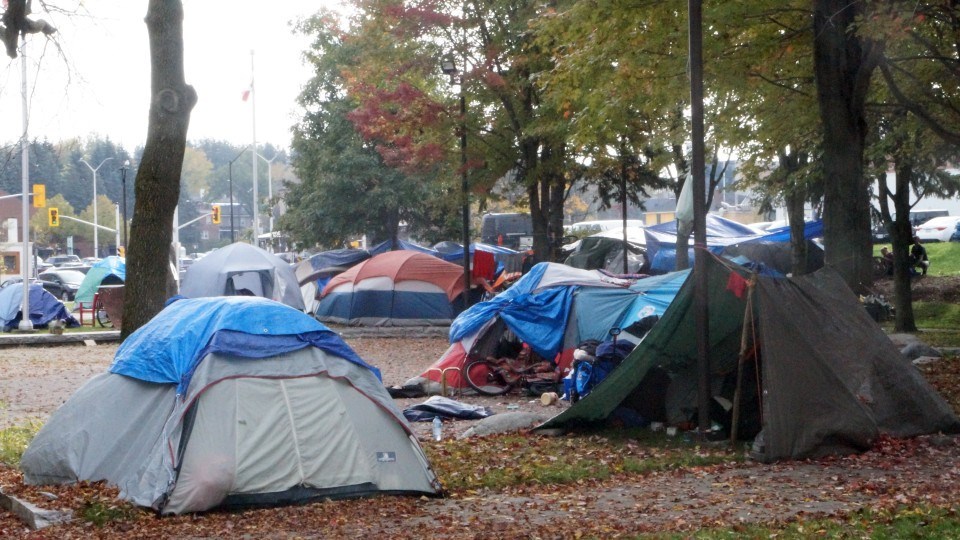The COVID-19 outbreak declared in Memorial Park more than three months ago is finally over, with more than 63 people who were experiencing homelessness isolated in connection with the original three cases found. Of those 63, only 44 were COVID positive.
An outbreak is considered over when two weeks have passed without a case linked to the original outbreak.
The public outbreak was declared on Oct. 12, but applied to anyone who had spent a “period longer than just passing though” in the park since Sept. 27. Spencer said that of the 63 people, only 44 were actually COVID Positive, the rest were isolating awaiting results.
Those who had been to the park beyond just passing through were advised to self-monitor for symptoms, get tested, and to self-isolate.
Challenges to managing the outbreak presented themselves early in the process, with identification being a hurdle to overcome, said Spencer. It was such a challenge at the time that the testing had to be postponed so as to coordinate with community partners, but an important factor for not only linking to a person’s health record, and for follow up treatments.
Testing began on Oct. 14, with Greater Sudbury community paramedics set up in the YMCA parking lot offering appointment-free testing. Public Health Sudbury and Districts was on site to continue to coordinate vaccinations, with public health nurses moving through the park, connecting with the population and offering to facilitate a vaccination.
“During the outbreak, testing was offered very regularly, at least weekly, downtown by the community paramedicine program,” said Spencer, adding that anyone could opt to be tested whether they were symptomatic or not. “That testing is going to continue, we're going to continue to have opportunities for people to be tested using rapid testing now, so that people who are homeless have access and can stay on top of their COVID status.”
While awaiting testing or while isolating due to the virus, those who were homeless stayed in one of the 15 motel beds the city rents. The motel was used early in the pandemic to help with shelter outbreaks, as well as housing those unable to find room in the shelter due to capacity limitations, and will be maintained beyond this outbreak as the case numbers for omicron surge and raise the risk of another outbreak.
Spencer said that the motel stays offered an unexpected opportunity, the chance to offer services and connect someone with housing support while they await the two week isolation period.
“We really took the opportunity while people were in isolation, and were quiet and stable,” said Spencer.
She said that the city worked with community partners to provide meals, hygiene products and clothing, but also health care, access to mental health and addiction supports, Indigenous cultural supports as well as housing services.
“That was a great opportunity for us to really get a chance to connect with people, create relationships and talk to them about when, you know it was time to leave isolation where where could we go? How could we support them to get a housing opportunity and not just return to a homeless situation.”
Spencer said that the city was able to move some of those from the motel into permanent housing and that others moved in with family or a friend, and that the city did cover the cost for anyone who wished to return to their home community. The rest were added to the city’s coordinated access list, commonly called the ‘by name list.’
From that point, they are connected with the support they need to find housing and any treatment needed.
“That was a very important strategy during people's isolation and a positive result, really, of having the opportunity to have people in a safe environment where we could have conversations,” said Spencer. “They weren’t worried about going out to find where they were going to sleep that night, but they had a chance to sort of stabilize as well, and then make some positive decisions about their next steps.”
Another side of the outbreak that could be seen as positive is the willingness to be vaccinated now shown by those affected, or within close contact.
“We have been working with public health, and since last spring they've had various clinics and different mobile units out in the downtown core, offering vaccinations,” said Spencer. “But I think this most recent outbreak really did increase people's willingness to be vaccinated, and really identified the fact that you can get very sick from COVID. And for some people, it helped them make the decision that they did want to be vaccinated.”
Staffing has become an issue at the warming centre recently, however, with the location at 199 Larch having to close briefly over the holidays due to lack of staff. While a recent hiring focus will help that, Spencer said that there are going to be challenges ahead nonetheless.
“We're hoping that that situation is for the immediate near future is stable,” she said, “However, we are having conversations with all of our programs, services, our community partners, because we are aware that the province is telling us that all sectors can expect maybe up to 25 to 30 per cent stopping or shortages because of this new Omicron variant.”
All outbreaks are detailed and updated on the Public Health Sudbury and Districts website, found here.
